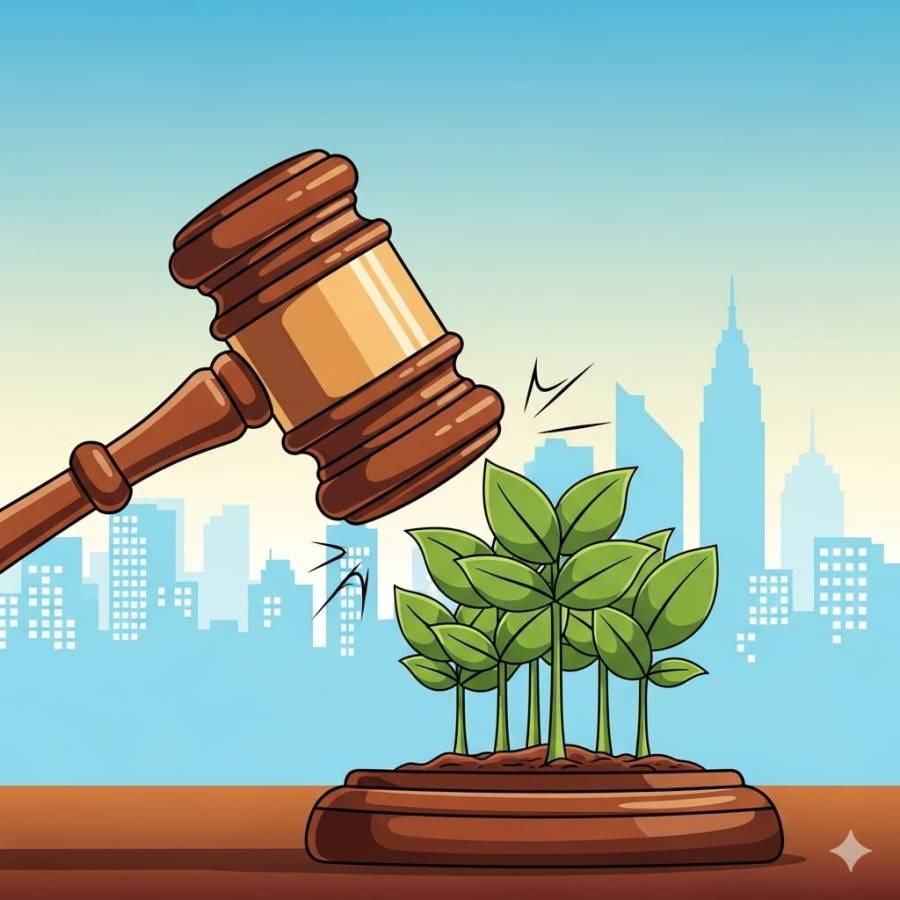
In a significant move reflecting the judiciary’s commitment to environmental protection, the Supreme Court of India has ordered the Delhi Development Authority (DDA) to undertake a large-scale compensatory afforestation project. The directive comes in response to the DDA’s illegal felling of trees in the ecologically sensitive Delhi Ridge area to construct a road leading to a multi-specialty hospital near Chhattarpur.
Under the court’s order, the DDA must plant 167,000 tree saplings across 185 acres of land within Delhi. The Supreme Court has set March 31, 2026, as the final deadline for completing this massive greening initiative, stressing the urgent need to restore the city’s depleting green cover.
The Genesis of the Order: Contempt and Compensation
The recent directive stems from a May judgment in which the court found the DDA in contempt for violating a 1996 order prohibiting non-forest activity in the Ridge without prior approval. The felling of hundreds of trees for an access road was termed a serious ecological breach.
Initially, the court had ordered that 185 acres be set aside for compensatory afforestation. However, a committee of experts later determined that the sites proposed by the DDA were unsuitable for large-scale plantation. Addressing this issue, the latest directive instructs the DDA to hand over 18 separate land parcels totalling 185 acres to the Delhi Forest Department.
The bench comprising Justices Surya Kant, Ujjal Bhuyan, and Joymalya Bagchi observed that spreading the plantations across several locations would yield greater environmental benefits and ensure equitable green distribution throughout the city.
Ensuring Survival: Implementation and Oversight
Taking note of inputs from the Delhi Forest Department, the bench agreed to extend the plantation deadline to March 2026. Experts had cautioned that planting during the winter months would reduce sapling survival rates. The court emphasized that its goal was not just the act of planting trees but ensuring their long-term survival and growth.
To facilitate effective implementation, the Supreme Court directed the DDA to release an initial ₹46 crore to the Forest Department to cover all project expenses, with additional funds to be provided if required. The DDA must also construct boundary walls around all 18 plots to protect the saplings from encroachment, grazing, and other potential damage. This measure aims to safeguard both the ecological investment and the public funds involved.
Accountability and Environmental Restoration
The judgment sends a strong message to all government agencies that environmental responsibility must come before administrative convenience. By setting firm timelines and financial obligations, the court has held the DDA accountable for its actions and ensured corrective measures are implemented effectively.
The Forest Department, under the supervision of the expert committee, has been directed to prepare a detailed report on the suitability and utilization of the entire 185-acre area. The court further ordered that an official notification be issued to permanently designate this land for compensatory afforestation only, preventing any future misuse or diversion for non-forest activities.
This landmark ruling marks a turning point in Delhi’s efforts to combat pollution and urban expansion. If executed effectively, the initiative will enhance the city’s green cover, improve air quality, and offer long-term environmental benefits. It stands as a reminder that ecological restoration is not just a legal requirement but a shared moral duty—transforming a violation into a victory for the environment and reaffirming that progress must coexist with preservation.





















